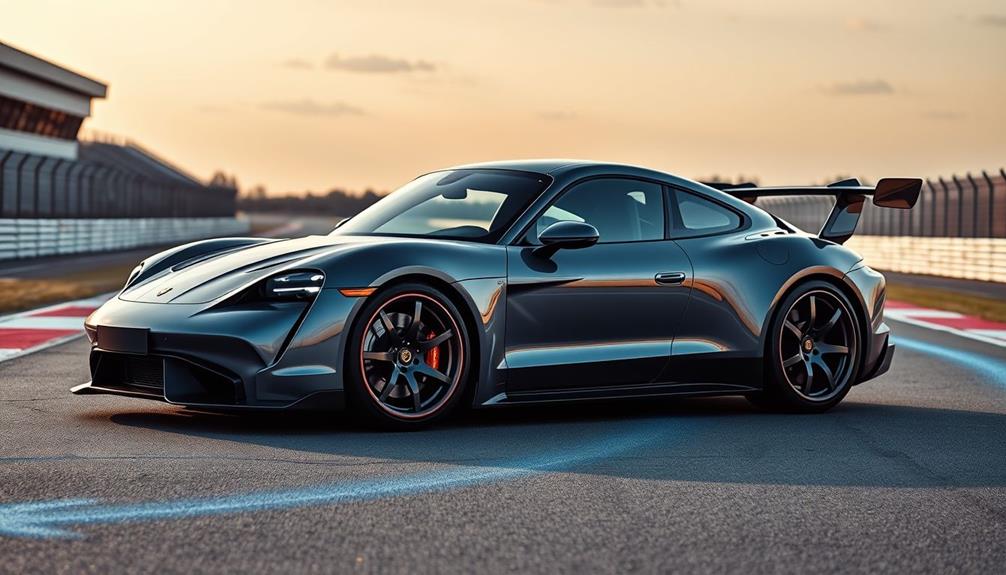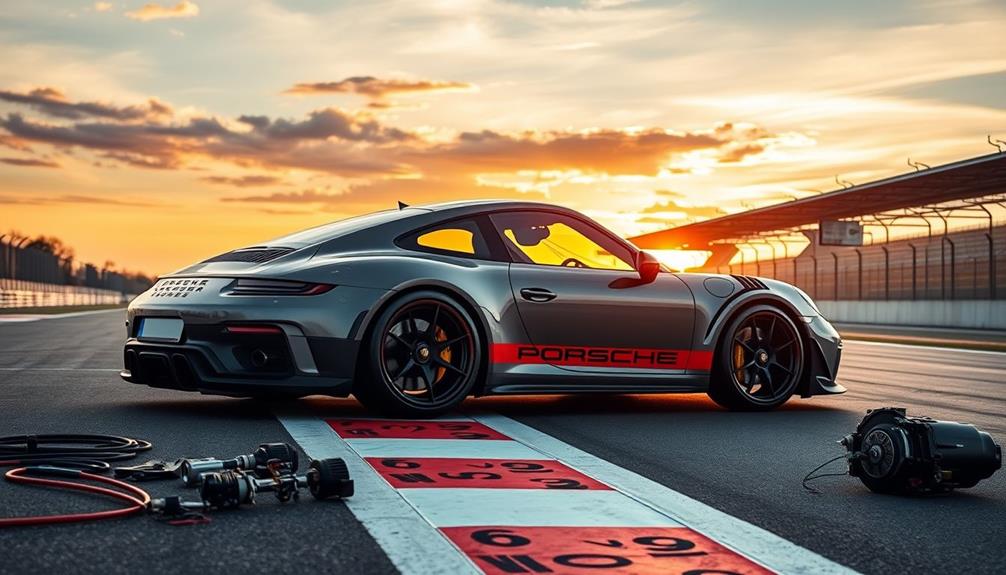Tuning your Porsche Taycan can elevate both power and efficiency to new heights. You can boost the RWD base model's output from 400 HP to between 547 and 571 HP. This upgrade not only improves acceleration times but also enhances your driving experience considerably. By optimizing battery management and aerodynamics, you'll enjoy a thrilling ride while maintaining impressive range. Just be mindful of the potential warranty implications, as modifications may void your coverage. There are various aftermarket options available to enhance your Taycan's performance, and there's much more to discover about the benefits and risks involved.
Key Takeaways
- Tuning the Porsche Taycan can increase power output significantly, with the RWD base model reaching up to 571 horsepower.
- Enhanced acceleration response is achieved through optimized battery management, reducing launch times for a more exhilarating driving experience.
- Aftermarket tuning solutions like HGP-Turbo software allow for customizable performance enhancements while ensuring compatibility with existing vehicle systems.
- Aerodynamic features, such as an adjustable rear spoiler and active aerodynamics, further improve efficiency and performance at higher speeds.
- Be mindful of warranty implications, as tuning modifications may void manufacturer warranties and complicate future resale of the vehicle.
Overview of Porsche Taycan Performance
The Porsche Taycan stands out as a remarkable fusion of cutting-edge technology and exhilarating performance. If you're considering electric sports cars, this model redefines what's possible in the category.
With a powerful electric drivetrain delivering approximately 750 horsepower in the Turbo S variant, you can rocket from 0 to 60 mph in just 2.4 seconds.
Not only does it boast impressive acceleration, but the Taycan also offers a substantial driving range of up to 421 miles (678 km) under WLTP standards, a significant 35% increase over previous models.
Its advanced aerodynamics, featuring a drag coefficient of 0.22, maximizes both performance and energy efficiency, setting it apart from competitors.
Charging is a breeze, too. You can go from 10 to 80% in just 18 minutes, thanks to optimized charging efficiency and a maximum capacity of 320 kW.
The addition of a new rear-axle motor adds 80 kW to the powertrain, elevating your driving experience.
The Porsche Taycan isn't just another electric sports car; it's an engineering marvel that offers both power and practicality.
Benefits of Tuning Your Taycan
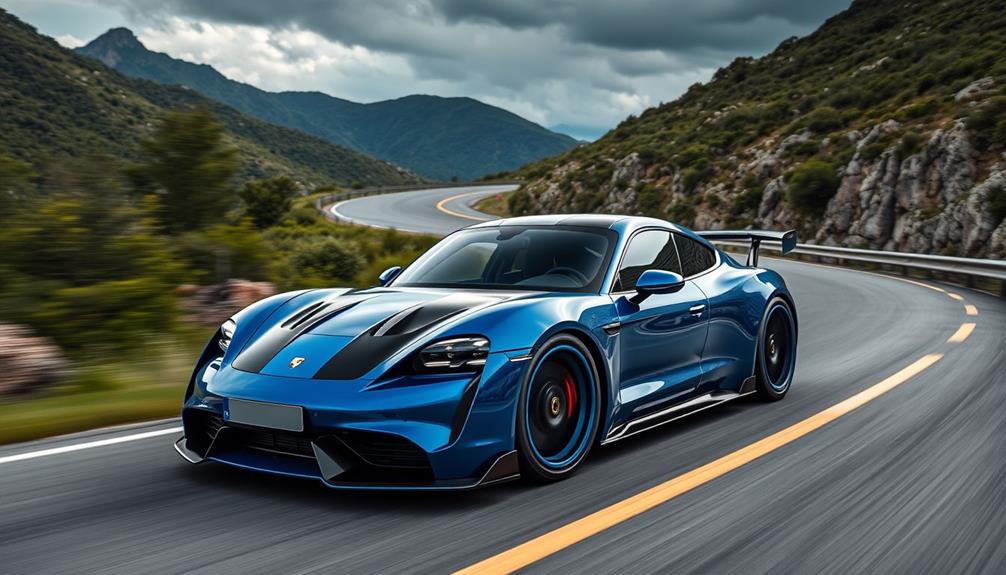
Tuning your Porsche Taycan can considerably boost its power output, giving you a thrilling experience behind the wheel.
With enhanced acceleration response, you'll notice quicker take-offs and a more engaging drive.
Whether you're a performance enthusiast or just want a sportier ride, tuning can elevate your Taycan to new heights.
Increased Power Output
Releasing the full potential of your Porsche Taycan can transform your driving experience. By tuning your electric vehicle, you can considerably boost the power output of the RWD base model from around 400 HP to an impressive 547-571 HP. This enhancement provides a competitive edge against rivals and elevates your Taycan Turbo S to new heights.
Consider the benefits of increased power output:
- Enhanced Performance: Experience a noticeable improvement in overall performance.
- Improved 0-60 mph Times: Tuning optimizes battery temperature and charge levels for maximum horsepower.
- More Engaging Drive: Enjoy a more thrilling driving experience, as users report higher satisfaction with acceleration.
- Launch Control Power: The RWD Taycan PB+ can achieve 470 HP, showcasing the released potential.
- Competitiveness: Position your Taycan competitively in the electric vehicle market, satisfying your desire for aggressive acceleration.
With tuning, you're not just upgrading numbers; you're transforming your Taycan from a remarkable electric vehicle into a powerhouse on the road.
Embrace the exhilarating performance and let your Taycan shine!
Improved Acceleration Response
When you release the potential of your Porsche Taycan through tuning, you'll notice a notable improvement in acceleration response. Tuning can boost horsepower considerably, with RWD base models achieving up to 571 HP. This means quicker launch times and an exhilarating drive that you won't forget. With HGP-Turbo software optimizing the battery management system, your Taycan will respond faster than ever.
Here's a quick comparison of acceleration metrics:
| Model | Tuned Output (HP) | 0-60 mph (seconds) |
|---|---|---|
| Taycan RWD Base | 547-571 | 3.5 |
| Taycan Turbo | 616 | 2.4 |
| RS Etron-GT | Tuned | 3.2 |
| Taycan 4S | 562 | 3.1 |
| Taycan Turbo S | 750 | 2.6 |
Risks and Warranty Implications

When you tune your Porsche Taycan, you might boost performance, but it can also raise warranty concerns.
If modifications lead to component failures, Porsche could contest warranty claims, leaving you vulnerable to legal disputes.
It's essential to weigh these risks before making any performance upgrades.
Warranty Voiding Concerns
Tuning your Porsche Taycan can come with significant warranty voiding concerns that every owner should consider.
While the Magnuson Moss Warranty Act provides some protection, the implications of performance enhancements can lead to substantial risks, particularly regarding the battery and other components.
Here are some key points to keep in mind:
- Warranty Claims: Manufacturers may contest warranty claims on tuned vehicles, especially if modifications lead to failures.
- Battery Issues: Your warranty may explicitly deny coverage for battery replacements if you've made performance adjustments.
- Financial Burden: The costs of replacing a battery can be significant, and you may be left footing the bill if your warranty is voided.
- Resale Complications: Selling a tuned Taycan could become complicated, as potential buyers might hesitate due to warranty voiding.
- Safety Concerns: Enhanced performance might exceed manufacturer safety margins, raising risks not just for your warranty but also for your safety.
Before proceeding with any tuning, weigh these concerns carefully.
It's crucial to understand how modifications could impact your warranty and financial obligations down the road.
Legal Dispute Risks
Modifying your Porsche Taycan isn't just about enhancing performance; it can also lead to significant legal dispute risks tied to warranty implications. When you tune your vehicle, you might unknowingly void the manufacturer's warranty, especially if performance enhancements lead to component failures, like issues with the battery system. Although the Magnuson Moss Warranty Act protects you, manufacturers often contest warranty claims related to tuned vehicles.
Here's a quick breakdown of the potential risks involved:
| Risk Type | Description | Impact on Warranty |
|---|---|---|
| Tuning Modifications | Modifying components can lead to failures. | May void the warranty. |
| Legal Disputes | Selling a tuned vehicle can cause buyer disputes. | Unclear warranty coverage. |
| Usage History | Excessive driving habits complicate claims. | May invalidate coverage. |
| Tracking Challenges | Lack of standard tracking for modifications increases risk. | Difficulties in claims. |
Be aware that excessive use and aggressive driving often associated with tuning can complicate warranty claims. Ultimately, it's essential to weigh the benefits of tuning against the potential legal disputes and warranty implications that can arise.
User Experiences and Feedback
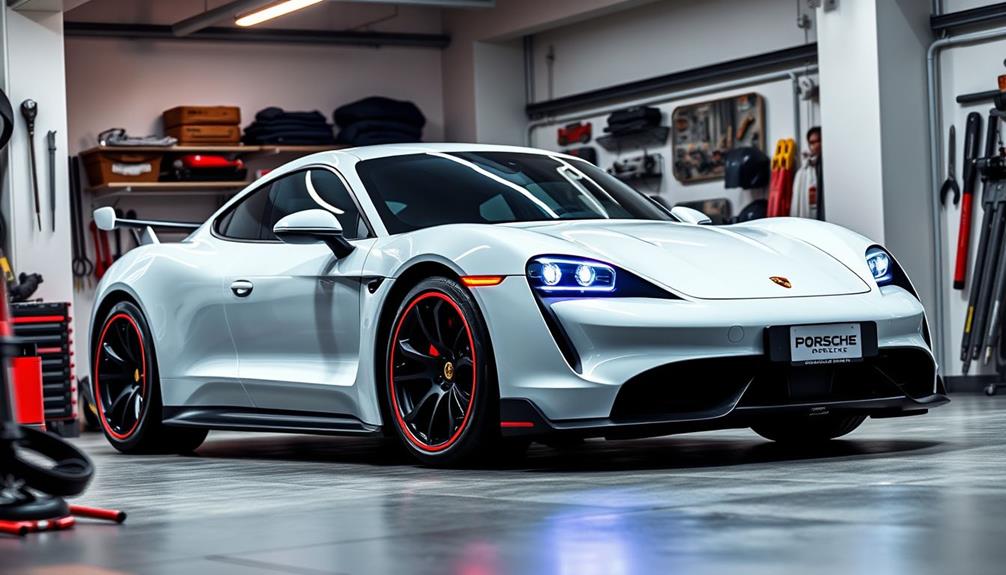
Many Porsche Taycan owners are enthusiastic to explore tuning options that could enhance their daily driving experience and boost acceleration. However, many face a mix of excitement and concern when considering these modifications. Some report dissatisfaction with the factory performance, especially compared to lower-cost competitors, driving their desire for more aggressive tuning solutions.
Users frequently share their experiences, highlighting several key points:
- Performance Improvements: Many owners have accessed additional horsepower with tuning, but gains vary based on battery charge and temperature conditions.
- Battery Reliability: Concerns about battery health arise, making evaluations essential, especially for used Taycan purchases.
- Warranty Risks: There's a common fear of voiding warranties due to tuning modifications, leading to hesitation among some enthusiasts.
- Daily Driving Impact: Owners appreciate the potential for enhanced acceleration, but they also weigh the risks involved.
- Community Support: Engaging with fellow Taycan owners for advice on tuning options can be invaluable.
Aftermarket Tuning Solutions

How can aftermarket tuning solutions elevate your Porsche Taycan's performance? By opting for these enhancements, you can gain significant improvements in battery performance and acceleration. Solutions like HGP-Turbo software offer customizable settings designed to enhance your driving experience.
For instance, tuning your RWD base Taycan could boost its output to an impressive 547-571 HP under ideal conditions.
While aftermarket tuning solutions can deliver exhilarating power, it's important to evaluate the associated risks. Manufacturers like Porsche may void warranties if they link tuning to component failures, particularly concerning battery-related claims.
However, many third-party options use the same battery and motor components found across various Taycan models, enabling you to enjoy performance variations without sacrificing hardware consistency.
The growing demand for these tuning solutions reflects a shift in the market, where performance enthusiasts are keen to push the boundaries of electric vehicles.
By investing in aftermarket tuning, you're not just enhancing performance; you're also participating in an evolving landscape that encourages manufacturers to explore tuning options in future designs.
Embrace the potential and take your Porsche Taycan to the next level!
Aerodynamics and Efficiency Gains
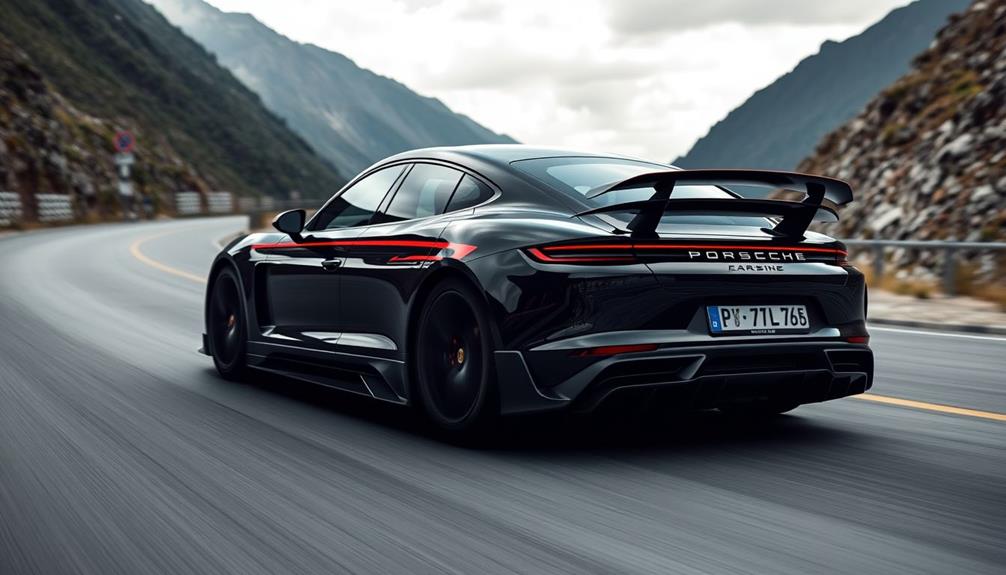
Aftermarket tuning solutions can enhance your Porsche Taycan's performance, but they're only part of the equation when it comes to maximizing efficiency.
By improving aerodynamics, you can greatly boost your electric sports car's range and overall driving experience. The Taycan is already designed with impressive aerodynamic features, but here's how you can take it further:
- Drag Coefficient: With a drag coefficient of just 0.22, the Taycan is a leader in aerodynamics within the Porsche lineup.
- Air Curtains: These guide airflow over the front wheels, reducing turbulence and enhancing efficiency.
- Active Aerodynamics: Variable cooling air flaps optimize drag, ensuring performance and range are balanced.
- Adjustable Rear Spoiler: It adapts to conditions, lowering drag during long trips and minimizing lift on the track.
- Adaptive Air Suspension: This system lowers the vehicle at higher speeds, further reducing drag and maximizing efficiency.
Electrical System Modifications
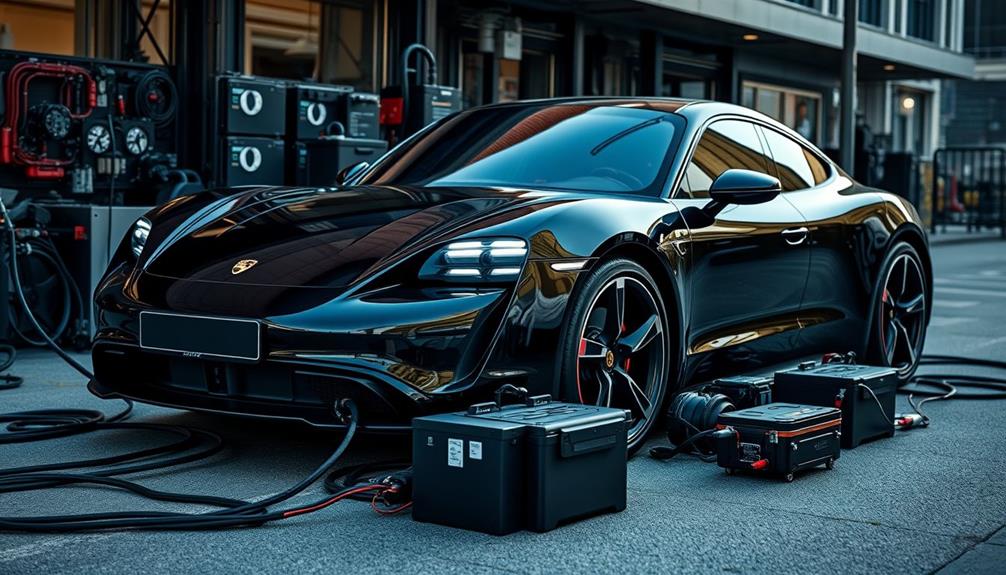
When it comes to enhancing your Porsche Taycan's performance, electrical system modifications play a essential role. By upgrading your battery management system, you can optimize performance metrics and improve acceleration response times. This is fundamental for achieving the best driving experience in your electric sports car.
The Taycan's electrical architecture supports tuning software like HGP-Turbo, allowing you to customize performance settings without compromising battery integrity. Upgraded inverters, particularly those from the Turbo S variant, can greatly enhance power delivery and efficiency, operating at nearly 98%. This improvement means you're getting the most out of your vehicle's electric capabilities.
Additionally, modifications can boost your charging capabilities, enabling maximum charging capacity of 320 kW. This allows your Taycan to achieve a remarkable 10 to 80% charge in just 18 minutes.
Careful tuning of the electrical system can also increase the overall power output. With tuned rear-wheel-drive base Taycans, you could see power outputs ranging from 547 to 571 HP, giving you that exhilarating performance you desire.
Embrace these electrical modifications to reveal your Taycan's true potential.
Future of Taycan Tuning

As the landscape of electric vehicle tuning evolves, the future of Taycan enhancements looks incredibly promising. With the next generation of Taycan models on the horizon, you can expect significant performance improvements. Tuning packages may push RWD base models to an impressive 547-571 HP, making your electric sports car even more exhilarating to drive.
Here's what you can look forward to in Taycan tuning:
- Increased Horsepower: Expect significant gains in power output.
- Enhanced Acceleration: Tuning can improve response times, making your rides more thrilling.
- Third-Party Options: Companies like HGP-Turbo are emerging to provide innovative solutions.
- BEV-Specific Software: New software is being developed specifically for performance tuning in electric vehicles.
- Shifting Market Dynamics: As demand grows, manufacturers are likely to embrace high-performance modifications.
While performance tuning offers these exciting benefits, it's essential to be aware of potential risks, particularly regarding warranties.
As more enthusiasts embrace these modifications, the Taycan's future in the tuning world looks bright, setting the stage for you to enjoy a truly personalized driving experience.
Market Trends in EV Tuning

There's no denying that market trends in EV tuning are rapidly evolving, reflecting a shift in consumer interest and demand for performance upgrades. As the first EV from Porsche, the Taycan is at the forefront of this movement, with tuning solutions like HGP-Turbo emerging to enhance performance and customization options.
Enthusiasts are increasingly keen to access additional horsepower while balancing the risks of voiding warranties or encountering safety issues. The demand for performance upgrades among EV owners is growing, as they seek acceleration enhancements similar to traditional internal combustion engine modifications.
Companies like Hennessey Performance Engineering are stepping into the EV tuning arena, showcasing a trend toward high-performance modifications that cater to evolving customer preferences for power and efficiency.
This expanding tuning capability in the EV market indicates a broader acceptance of performance-enhancing modifications, which could prompt manufacturers to evaluate built-in tuning options for future models.
As you explore the Porsche Active tuning landscape, you'll find that blending efficiency with performance is becoming the standard, reshaping how you experience your electric sports car.
Frequently Asked Questions
Can a Porsche Taycan Be Remapped?
Yes, you can remap a Porsche Taycan. This process modifies the ECU, releasing additional horsepower. However, be cautious, as aftermarket modifications might void your warranty and lead to potential legal disputes regarding coverage.
What Are the Improvements to the Taycan Battery?
Think of the Taycan's battery as a finely tuned orchestra, now playing louder and longer. You'll appreciate its 35% extended range, rapid charging, and advanced management systems that harmonize performance and efficiency beautifully.
Is Porsche Taycan Efficient?
Yes, the Porsche Taycan's efficiency impresses. With a remarkable range, fast charging capabilities, and advanced recuperation systems, you'll find it ideally designed for both performance and energy conservation during your drives. Enjoy the ride!
Can You Chip a Taycan?
Yes, you can chip a Taycan to enhance its performance. However, be cautious, as tuning may void your warranty and could lead to component failures. Always consider the risks before making modifications to your vehicle.
Conclusion
In summary, tuning your Porsche Taycan can greatly enhance both its power and efficiency. With up to a 20% increase in horsepower and the potential for improved range, it's a compelling option for performance enthusiasts. However, it's essential to weigh the benefits against possible warranty risks. As the market for EV tuning continues to grow, staying informed about the latest trends will help you make the best decisions for your electric sports car. When considering tuning your Porsche Taycan, it’s important to work with a reputable and experienced tuner who understands the unique requirements of electric vehicles. Modern power upgrades are constantly evolving and can offer exciting opportunities for further enhancing your Taycan’s performance. By staying informed and taking the time to research your options, you can make informed decisions to ensure that your car performs at its best while minimizing any potential risks.
